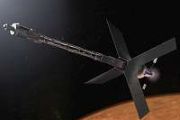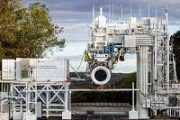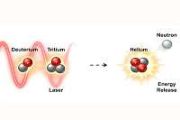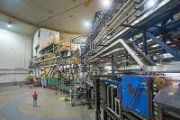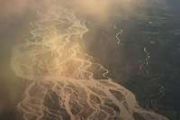
Copernical Team
Seeing through the fog-pinpointing young stars and their protoplanetary disks
 Imagine walking through a dense, hazy fog in the middle of the night, seeing patches of light from cars and towns shimmering in the distance. It's nearly impossible to tell if the lights are deep in the fog or beyond it. Astronomers trying to find young stars face a similar problem: the light from stars they're hunting is shimmering through great big regions of hazy gas and dust in space, called
Imagine walking through a dense, hazy fog in the middle of the night, seeing patches of light from cars and towns shimmering in the distance. It's nearly impossible to tell if the lights are deep in the fog or beyond it. Astronomers trying to find young stars face a similar problem: the light from stars they're hunting is shimmering through great big regions of hazy gas and dust in space, called Mars' emitted energy and seasonal energy imbalance
 A seasonal imbalance in the amount of solar energy absorbed and released by the planet Mars is a likely cause of the dust storms that have long intrigued observers, a team of researchers reports.
Mars' extreme imbalance in energy budget (a term referring to the measurement of solar energy a planet takes in from the sun then releases as heat) was documented by University of Houston research
A seasonal imbalance in the amount of solar energy absorbed and released by the planet Mars is a likely cause of the dust storms that have long intrigued observers, a team of researchers reports.
Mars' extreme imbalance in energy budget (a term referring to the measurement of solar energy a planet takes in from the sun then releases as heat) was documented by University of Houston research A SAM Methane Experiment Between Drives Sols 3476-3477
 Curiosity continues to navigate challenging terrain. The drive executed over the weekend moved us 8 m from our previous location. Prior to the weekend drive, we completed contact science with APXS and MAHLI on targets "Pedra Pintada" and "San Pedro," the latter of which was brushed with the Dust Removal Tool (DRT) to remove thin airfall dust that was coating the surface of the rock face. Dust is
Curiosity continues to navigate challenging terrain. The drive executed over the weekend moved us 8 m from our previous location. Prior to the weekend drive, we completed contact science with APXS and MAHLI on targets "Pedra Pintada" and "San Pedro," the latter of which was brushed with the Dust Removal Tool (DRT) to remove thin airfall dust that was coating the surface of the rock face. Dust is Rocket engine exhaust pollution extends high into Earth's atmosphere
 Reusable space technology has led to a rise in space transportation at a lower cost, as popularized by commercial spaceflights of companies like SpaceX and Virgin Galactic. What is poorly understood, however, is rockets' propulsion emissions creating significant heating and compositional changes in the atmosphere.
In Physics of Fluids, by AIP Publishing, researchers from the University of
Reusable space technology has led to a rise in space transportation at a lower cost, as popularized by commercial spaceflights of companies like SpaceX and Virgin Galactic. What is poorly understood, however, is rockets' propulsion emissions creating significant heating and compositional changes in the atmosphere.
In Physics of Fluids, by AIP Publishing, researchers from the University of NASA Seeks Input on Moon to Mars Objectives, Comments Due May 31
 As NASA moves forward with plans to send astronauts to the Moon under Artemis missions to prepare for human exploration of Mars, the agency is calling on U.S. industry, academia, international communities, and other stakeholders to provide input on its deep space exploration objectives.
NASA released a draft set of high-level objectives Tuesday, May 17, identifying 50 points falling under
As NASA moves forward with plans to send astronauts to the Moon under Artemis missions to prepare for human exploration of Mars, the agency is calling on U.S. industry, academia, international communities, and other stakeholders to provide input on its deep space exploration objectives.
NASA released a draft set of high-level objectives Tuesday, May 17, identifying 50 points falling under Astronauts may one day drink water from ancient moon volcanoes
 Billions of years ago, a series of volcanic eruptions broke loose on the moon, blanketing hundreds of thousands of square miles of the orb's surface in hot lava. Over the eons, that lava created the dark blotches, or maria, that give the face of the moon its familiar appearance today.
Now, new research from CU Boulder suggests that volcanoes may have left another lasting impact on the luna
Billions of years ago, a series of volcanic eruptions broke loose on the moon, blanketing hundreds of thousands of square miles of the orb's surface in hot lava. Over the eons, that lava created the dark blotches, or maria, that give the face of the moon its familiar appearance today.
Now, new research from CU Boulder suggests that volcanoes may have left another lasting impact on the luna Dwarf planet Ceres was formed in coldest zone of Solar System and thrust into Asteroid Belt
 In an article published in the journal Icarus, researchers at Sao Paulo State University (UNESP) and collaborators report the findings of a study reconstituting the formation of the dwarf planet Ceres. The research was conducted by Rafael Ribeiro de Sousa, a professor in the program of graduate studies in physics on the Guaratingueta campus. The co-authors of the article are Ernesto Vieira Neto,
In an article published in the journal Icarus, researchers at Sao Paulo State University (UNESP) and collaborators report the findings of a study reconstituting the formation of the dwarf planet Ceres. The research was conducted by Rafael Ribeiro de Sousa, a professor in the program of graduate studies in physics on the Guaratingueta campus. The co-authors of the article are Ernesto Vieira Neto, Solar heat likely the primary cause of dust storms on Mars
 A team of scientists, including Dr. German Martinez from the Universities Space Research Association at LPI, just published a study in the Proceedings of the National Academy of Sciences. This study indicates there are seasonal energy imbalances in the amount of solar energy absorbed and released by Mars which is a likely cause of dust storms, and could play an important role in understanding th
A team of scientists, including Dr. German Martinez from the Universities Space Research Association at LPI, just published a study in the Proceedings of the National Academy of Sciences. This study indicates there are seasonal energy imbalances in the amount of solar energy absorbed and released by Mars which is a likely cause of dust storms, and could play an important role in understanding th NASA's InSight still hunting marsquakes as power levels diminish
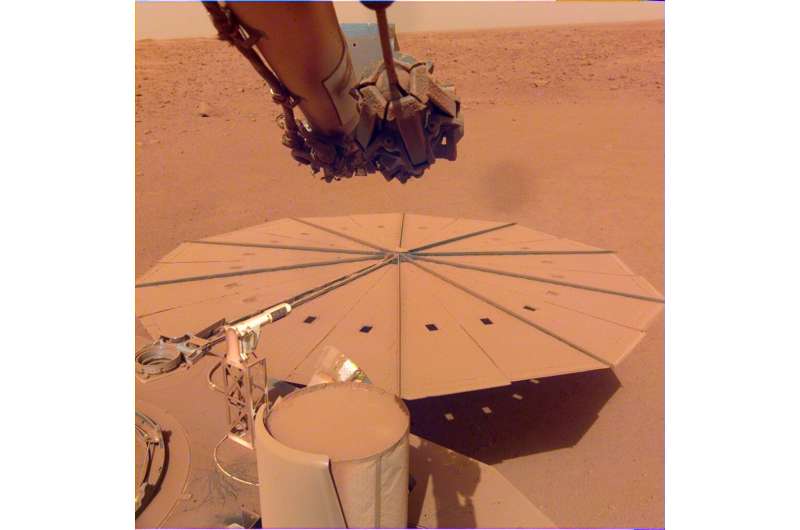
Dusty solar panels and darker skies are expected to bring the Mars lander mission to a close around the end of this year.
NASA's InSight Mars lander is gradually losing power and is anticipated to end science operations later this summer. By December, InSight's team expects the lander to have become inoperative, concluding a mission that has thus far detected more than 1,300 marsquakes—most recently, a magnitude 5 that occurred on May 4—and located quake-prone regions of the Red Planet.
The information gathered from those quakes has allowed scientists to measure the depth and composition of Mars' crust, mantle, and core. Additionally, InSight (short for Interior Exploration using Seismic Investigations, Geodesy and Heat Transport) has recorded invaluable weather data and studied remnants of Mars' ancient magnetic field.
NASA's InSight lander: The lonely fate of a robot on Mars

Covered in the red dust that sealed its fate, the NASA InSight lander is slowly shutting down, more than 250 million kilometers from home.
With its solar panels now obscured by the red planet's debris, the four-year-old robot is running out of power. One by one, its instruments are being taken offline: its robotic arm moving into "retirement pose," its seismometer likely to be turned off sometime in June.
Dr. Catherine Johnson, co-investigator on the InSight science team and professor in the department of earth, ocean and atmospheric sciences, discusses what the team discovered, what questions are left to answer, and just what will happen to the little lander that could.
What was the lander's mission and what did it find?


